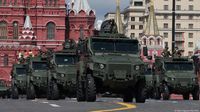On May 9, 2025, the ongoing conflict between Russia and Ukraine saw significant developments as Russian forces continued their attacks despite a declared ceasefire coinciding with Victory Day celebrations in Moscow. The day marked a grim reminder of the war's toll, with Russian glide bombs striking Sumy Oblast, and Ukrainian officials reporting civilian casualties.
Ukraine's Air Force spokesperson, Yuriy Ihnat, confirmed that Russian forces launched 130 guided aerial bombs on Sumy Oblast on May 8, and continued with 56 guided bombs by midday on May 9. "Despite the Kremlin's unilateral announcement of a truce from May 8 to May 11, heavy fighting persisted across multiple regions," Ihnat stated. He noted that nearly ten Russian aircraft were spotted near the front lines in Donetsk, Zaporizhzhia, and Sumy sectors.
Before the ceasefire began, Russia had also unleashed three waves of drones totaling over 200, with Ukrainian forces managing to shoot down 101 of them. However, the situation escalated further on the morning of May 9, as Russian attacks resulted in injuries and fatalities among Ukrainian civilians in at least two oblasts.
In response to Russia's aggression, European foreign ministers convened in Lviv on the same day and approved the establishment of a special tribunal aimed at prosecuting Russia's top political and military leadership, including President Vladimir Putin. This tribunal, operating under the auspices of the Council of Europe, seeks to hold Moscow accountable for its actions in Ukraine, which have been described as the gravest violations of international law.
The coalition of nations involved in this initiative stated, "We welcome the completion of technical work on the legal instruments necessary to establish the tribunal." The next steps are set for the Council of Europe's Committee of Ministers meeting in Luxembourg on May 13–14, 2025.
Meanwhile, the European Union announced plans to provide Ukraine with over 1.35 million artillery shells in 2025, alongside nearly 1.9 billion euros (approximately $2.1 billion) in military aid sourced from frozen Russian assets. Ukrainian Foreign Minister Andrii Sybiha expressed gratitude for the EU's commitment, stating that this support is crucial for Ukraine's defense efforts.
Sybiha emphasized that by the end of 2025, European partners must send at least 1.35 million shells to Ukraine, with ongoing discussions to increase this number. Prime Minister Denys Shmyhal highlighted the historic nature of this decision, noting that funds from frozen Russian assets would be utilized to purchase weapons, including artillery and ammunition, directly from Ukrainian manufacturers.
French Foreign Minister Jean-Noël Barrot also announced that profits from frozen Russian assets would be allocated for the maintenance of CEASAR 155mm howitzers, which have been vital to Ukraine's military efforts since the onset of the full-scale invasion.
In a parallel development, the United States and European allies are reportedly finalizing a proposal for a 30-day unconditional ceasefire in the ongoing conflict. This proposal comes on the heels of U.S. President Donald Trump's call for such a ceasefire on May 8. However, past attempts at ceasefires have been marred by violations, particularly from the Russian side.
"We felt a certain irritation towards the Russian posture, the lack of reactivity and seriousness in its responses to what was proposed before," a French diplomatic source remarked, indicating the challenges ahead in achieving a lasting peace.
In another significant event, the Security Service of Ukraine (SBU) announced the dismantling of a Hungarian military intelligence network operating in Zakarpattia Oblast. The SBU detained two agents accused of espionage against Ukraine, marking a notable instance of foreign intelligence activities within its borders.
One of the suspects, a former Ukrainian military officer, was reportedly recruited by Hungarian intelligence and had been gathering intelligence on military defenses since September 2024. The SBU has charged both individuals with high treason under martial law, with potential sentences of life imprisonment and property confiscation.
Hungarian Foreign Minister Peter Szijjarto responded by claiming that Budapest had not received any official information about the case, labeling it as "Ukrainian propaganda" until further details are provided.
As these events unfolded, the Kremlin celebrated Victory Day not only in Moscow but also in the border town of Ivangorod, where broadcasts of the celebrations were aimed at residents of the neighboring Estonian city. This display of military might and national pride serves as a stark reminder of the ongoing tensions between Russia and its neighbors.
In summary, May 9, 2025, was marked by continued violence in Ukraine amid a declared ceasefire, significant international legal developments aimed at holding Russia accountable, and heightened military support for Ukraine from European allies. As the conflict continues, the stakes remain high for all parties involved, with the hope for a lasting resolution still uncertain.




